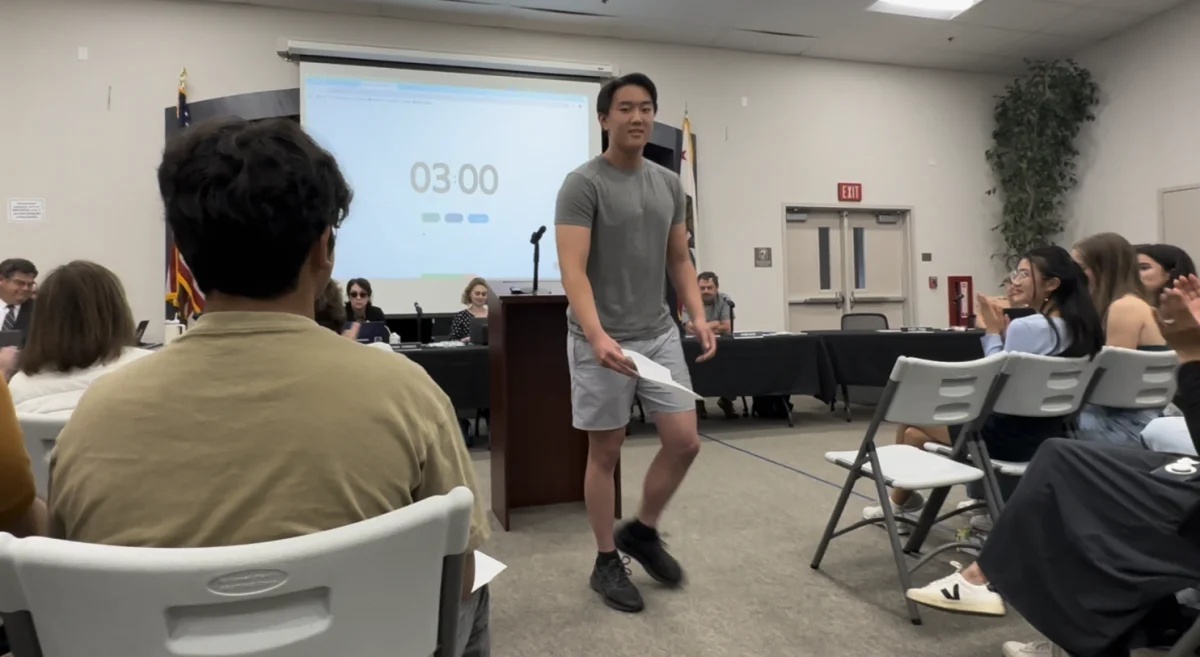Spiders…failure…death…and presentations? For years, public speaking has been at the top of surveys of America’s most common fears. A study by the National Institute of Mental Health found that nearly three quarters of Americans suffer from speech anxiety.
So why are we so scared?
For many, fear of public speaking stems from a fear of making a fool of ourselves.
“I guess what scares me [is that] when I get up there…there’s a sense of judgment,” junior Ryan Adibi said. “I care more if someone thinks I can’t articulate my opinion than if they disagree with what I’m saying.”
But like so many fears, the key to conquering it comes with self-confidence and a whole lot of practice.
“We are most afraid of things we haven’t ever done,” English Department Coordinator Keren Robertson said. “The more we face our fears, the easier it becomes to move through them. Getting that practice in a safe environment such as a classroom with peers who know them is a great training ground for other, scarier environments such as the work place.”
So when does public speaking become something more than just talking in front of people? For many proponents of oratory education, it’s when a mastery of this skill is an invaluable asset to those who possess it.
Experts argue that experience and ability with public speaking are related to higher self-confidence, better social proficiency and increased productivity. An analysis of these benefits reveals an important truth: public speaking skills have real benefits for high school students and should be emphasized in academic curriculum.
Pre-professional clubs like Speech and Debate, Model United Nations (UN) and Mock Trial provide skills, instruction and practice for many kinds of public speaking. Members of these clubs overwhelmingly insist that the public speaking skills they obtain through their participation are invaluable assets both in school and in their daily lives.
“[Speech and Debate] just makes you so much more comfortable and confident when you are talking in class,” freshman Shruti Janeja said. “It makes you feel like you are saying something that you want other people to listen to and then take you seriously, if you can say it well.”
Being exposed to public speaking scenarios on a regular basis can help overcome initial hesitancy.
“Coming from an initially very shy person, learning how to speak and present myself in front of large audiences definitely had far reaching benefits,” Model UN member junior Samantha Dadok said.
These clubs provide excellent opportunities for students to develop public speaking skills. For just that reason, however, it is imperative that there is more of a push to integrate these valuable skills more into curriculum so that this gaining skillset is not limited to their participants.
Teachers and administration at the school recognize this potential. Both freshman and junior English classes specifically emphasize expository speechmaking as part of their curriculum. But the reason that these aren’t emphasized more in the curriculum is because the English department hopes to balance these skills with others they deem necessary.
“I think the opportunity and the teaching go hand in hand,” Robertson said. “We build in scaffolding towards assignments such as the speech [unit] through minor assignments such as Socratic discussions, and group presentations.”
In its essence, public speaking is about communicating effectively, an increasingly important skill in a dynamic, global society.
“[When you speak] you really have to be able to say what you mean clearly,” sophomore James Naumovski said. “A lot of the times if you are trying to make a point but you don’t really know how to say it, it really detracts from the message you are trying to convey.”
Knowing how to speak well is vital for effective communication in a variety of settings, including school and many professional fields, so why aren’t we doing more of it? English students have, on average, just one unit to practice their public speaking skills due to the goal of pursuing many different and distinct skills in students. This just isn’t long enough to master a skill that requires a lot of practice.
“I think that this is so important, that we should do even more than the five weeks we work on it in English,” Ryan said.
On an even bigger scale, proponents of public speaking education recognize that proficiency in public speaking can be a leadership skill.
“It has been my experience over the years that the students who come out of high school with [public speaking] skills already have an advantage when it comes to a lot of things that require leadership,” MVLA Speech and Debate team co-head coach Karen Keefer said.
This leadership translates to more success in a variety of both academic and workplace settings.
“It’s definitely helpful in presentations in classes and on our Socratic seminars in English,” MVHS freshman Bayley Tuch said. “I personally really enjoy them because I enjoy speaking in front of other people, but a lot of other people don’t enjoy them as much because they don’t get the practice and so they aren’t as capable.”
Students with oratory abilities not only have advantages in the classroom, but in the workforce as well.
“No matter what you want to do with your future you are always going to need to talk to people or explain what you do,” Bayley said.
In a survey done by the National Association of Colleges and Employers, employers in a variety of fields ranked “the ability to verbally communicate with persons inside and outside the organization” as the number one most important skill potential employees to have.
“Even the techy types will go off and be part of some kind of work group in their engineering class, and they’ll have to present the project to the class, and the person who has those public speaking skills [will] get to present the project,” Keefer said. “That person gets recognized in a way that other people in the group don’t, and they get opportunities that the other people in the group don’t necessarily get.”
As the school mirrors a national transition in education towards a STEM focus, it is imperative that we not forget the more basic, less flashy skills. Whether students end up as computer programmers or social workers, public speaking will be an invaluable skill.
Public speaking skills are the basis for successful communication with a group, which is necessary in many workplace settings. By teaching students to speak effectively in public and giving them ample opportunity to practice, schools are preparing their students for a competitive workforce.
The merits of public speaking skills are both abundant and diverse, and high school is a critical time to develop them. For this reason, the school should continue to emphasize these lessons in academic curriculum, and look for even more opportunities to do so.








